英语句子转换大全
六年级英语句式转换30道

六年级英语句式转换30道1. She is a student. (改为一般疑问句)答案:Is she a student? 解析:陈述句变一般疑问句,将be 动词is 提到句首,其余不变。
2. They are playing football. (改为一般疑问句)答案:Are they playing football? 解析:陈述句变一般疑问句,将be 动词are 提到句首,其余不变。
3. I am happy. (改为一般疑问句)答案:Are you happy? 解析:陈述句变一般疑问句,第一人称I 要变为第二人称you,be 动词am 变为are 提到句首。
4. This is a book. (改为一般疑问句)答案:Is this a book? 解析:陈述句变一般疑问句,将be 动词is 提到句首,其余不变。
5. Those are apples. (改为一般疑问句)答案:Are those apples? 解析:陈述句变一般疑问句,将be 动词are 提到句首,其余不变。
6. He likes music. (改为一般疑问句)答案:Does he like music? 解析:陈述句中没有be 动词,主语是第三人称单数he,借助助动词does 构成一般疑问句,likes 变回原形like。
7. We have lunch at school. (改为一般疑问句)答案:Do you have lunch at school? 解析:陈述句中没有be 动词,主语是we,变为一般疑问句时要变为you,借助助动词do 构成一般疑问句,have 形式不变。
8. They do their homework in the evening. (改为一般疑问句)答案:Do they do their homework in the evening? 解析:陈述句中没有be 动词,主语是they,借助助动词do 构成一般疑问句,do 的形式不变。
英语句型转换练习

英语句型转换练习English Sentence Transformation Exercises1. Original Sentence: The cat is sitting on the mat.Transformed Sentence: On the mat, the cat is seated.2. Original Sentence: She gave him a book yesterday.Transformed Sentence: Yesterday, she presented a book to him.3. Original Sentence: They are playing soccer in the park.Transformed Sentence: Soccer is being played by them in the park.4. Original Sentence: He will finish his homework before going to the party.Transformed Sentence: Before attending the party, he intends to complete his homework.5. Original Sentence: The teacher explained the concept to the students.Transformed Sentence: The concept was elucidated to the students by the teacher.6. Original Sentence: She is taller than her sister.Transformed Sentence: Her sister is not as tall as she is.7. Original Sentence: We saw a movie last night.Transformed Sentence: A movie was viewed by us last night.8. Original Sentence: The boy found the lost dog in the woods. Transformed Sentence: In the woods, the lost dog was discovered by the boy.9. Original Sentence: They have been living in this city for five years.Transformed Sentence: For five years, they have been residents of this city.10. Original Sentence: She will call you as soon as she arrives.Transformed Sentence: Upon her arrival, she will make acall to you.11. Original Sentence: The children are excited about the upcoming trip.Transformed Sentence: The upcoming trip is a source of excitement for the children.12. Original Sentence: He is reading a novel by the famous author.Transformed Sentence: A novel written by the renowned author is being read by him.13. Original Sentence: We will go to the beach if it doesn't rain.Transformed Sentence: Should the weather remain dry, we plan to visit the beach.14. Original Sentence: She has never been to Paris.Transformed Sentence: Visiting Paris has never been onher agenda.15. Original Sentence: The company has expanded itsoperations globally.Transformed Sentence: Globally, the company's operations have seen an expansion.16. Original Sentence: They will start the project next month. Transformed Sentence: The commencement of the project is scheduled for the following month.17. Original Sentence: He has a collection of rare stamps.Transformed Sentence: A collection of rare stamps is possessed by him.18. Original Sentence: The concert was canceled due to thebad weather.Transformed Sentence: The bad weather led to the cancellation of the concert.19. Original Sentence: She is learning to play the piano.Transformed Sentence: The piano is being learned by herto play.20. Original Sentence: The scientist made a groundbreaking discovery.Transformed Sentence: A groundbreaking discovery was made by the scientist.。
七年级英语句型转换1-100附答案
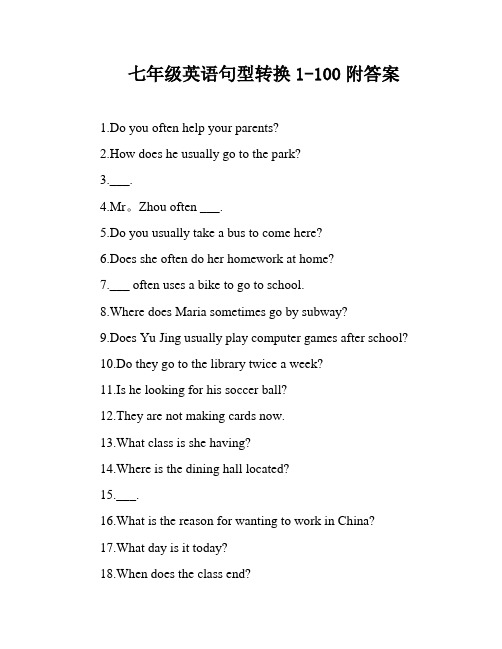
七年级英语句型转换1-100附答案1.Do you often help your parents?2.How does he usually go to the park?3.___.4.Mr。
Zhou often ___.5.Do you usually take a bus to come here?6.Does she often do her homework at home?7.___ often uses a bike to go to school.8.Where does Maria sometimes go by subway?9.Does Yu Jing usually play computer games after school?10.Do they go to the library twice a week?11.Is he looking for his soccer ball?12.They are not making cards now.13.What class is she having?14.Where is the dining hall located?15.___.16.What is the reason for wanting to work in China?17.What day is it today?18.When does the class end?19.What subject are you currently studying?20.How many lessons do they have every day?21.There is no picture on the wall.22.What is she making?23.There are boys in the room.24.Does Tom have books?25.___.26.How many days are there in a week?27.Where are your shoes located?28.Are there any books and a pen on my desk?29.Would you like to go to school by bus?30.What is on the table near the window?31.What is in the living room?32.There are no computers in our school.33.Is your study on the first floor or the second floor?34.Where are your books?___.36.There are some old men in the room.37.There is no meat on the plate.38.Is there a map of Beijing on the wall。
七年级英语句式转换30道

七年级英语句式转换30道1. 陈述句:She is a student. 疑问句:Is she a student? 解析:陈述句中有be 动词is,变为一般疑问句时将is 提到句首,句末用问号。
2. 陈述句:They are in the classroom. 疑问句:Are they in the classroom? 解析:陈述句中有be 动词are,变为一般疑问句时将are 提到句首。
3. 陈述句:I am happy. 疑问句:Am I happy? 解析:陈述句中有be 动词am,变为一般疑问句时将am 提到句首,注意第一人称I 变为第二人称you 时,be 动词要用are。
4. 陈述句:He likes apples. 疑问句:Does he like apples? 解析:陈述句中动词likes 是第三人称单数形式,变为一般疑问句时要借助助动词does,likes 变回原形like。
5. 陈述句:We play football on Sundays. 疑问句:Do we play football on Sundays? 解析:陈述句中动词play 是原形,变为一般疑问句时借助助动词do。
6. 陈述句:The dog runs fast. 疑问句:Does the dog run fast? 解析:陈述句中动词runs 是第三人称单数形式,变为一般疑问句时借助助动词does,runs 变回原形run。
7. 陈述句:My father works hard. 疑问句:Does my father work hard? 解析:陈述句中动词works 是第三人称单数形式,变为一般疑问句时借助助动词does,works 变回原形work。
8. 陈述句:She has a pen. 疑问句:Does she have a pen? 解析:陈述句中has 是have 的第三人称单数形式,变为一般疑问句时借助助动词does,has 变回原形have。
英语书后句子翻译英汉转换

英语书后句子翻译英汉转换一、1. 这座房子在地震中损毁严重,汤姆花了不少钱来修它。
The house was badly damaged in the earthquake, and Tom spent a lot of moneyrenovating it.2. 正如史蒂夫·乔布斯所指出的,不断摸索一直都是苹果模式的一部分。
As Steve Jobs noted, trial and error has always been part of the Apple model.3. 如果你总是无所事事,最后结果会怎样呢?当然是失败If you are idling around all the time, what will you wind up with? Of course, failure.4. 别犯错———现在可是关键时刻,谨慎是永远不会错的Don’t make a blunder—it is a critical time now, and caution will never be wrong.5. 你不要为难自己,毕竟你是个新手。
You shouldn’t beat yourself up; after all, you are a green hand.二、1.政府正努力改善公众的住房条件?The government is striving for improvements in public housing.2. 这五个圆环被认为象征了五大洲:欧洲?亚洲?非洲?大洋洲以及美洲?The five rings are thought to symbolize the five continents: Europe, Asia, Africa, Oceania and America.3.他父亲淡淡地一笑,试图要他放心,一切都安然无恙。
His father smiled weakly in an attempt to reassure him that everything was all right.4. 他的沉默实际就是拒绝。
高中英语句型转换讲解及练习

高中英语句型转换讲解及练习在高中英语研究中,句型转换是一个重要的部分。
通过转换句型,我们能够提升语言表达的灵活性和准确性。
本文将为你讲解一些常见的句型转换方法,并提供练题供你巩固。
1. 同义句型转换1.1 句式转换在同义句型转换中,我们可以通过改变句子的结构来表达相同的意思。
以下是一些常见的句式转换方法:- 肯定句转否定句:将句子中的动词前加“not”或使用否定词。
- 否定句转肯定句:将句子中的动词前去掉“not”或去掉否定词。
- 疑问句转陈述句:将疑问句改为陈述句的语序。
- 陈述句转一般疑问句:将陈述句的语序改为疑问句的语序。
- 一般疑问句转特殊疑问句:将一般疑问句的句式改为特殊疑问句的句式。
1.2 词汇转换除了句式转换,我们还可以通过更换词汇来表达相同的意思。
以下是一些常见的词汇转换方法:- 动词变形:使用动词的不同形式,如时态、语态等。
- 同根词替换:使用与原词有相同词根的词汇替换。
- 同义词替换:使用与原词意思相近的同义词替换。
2. 练题请根据以下句子进行句型转换练:1. Tom doesn't like playing basketball.2. Did you finish your homework last night?3. I can swim across the river.4. She is the most beautiful girl in our class.5. How often do you go to the cinema?答案:1. Tom dislikes playing basketball.2. You finished your homework last night, didn't you?3. It's possible for me to swim across the river.4. She is the girl in our class who is the most beautiful.5. What is the frequency of your visits to the cinema?。
英语句子转换大全
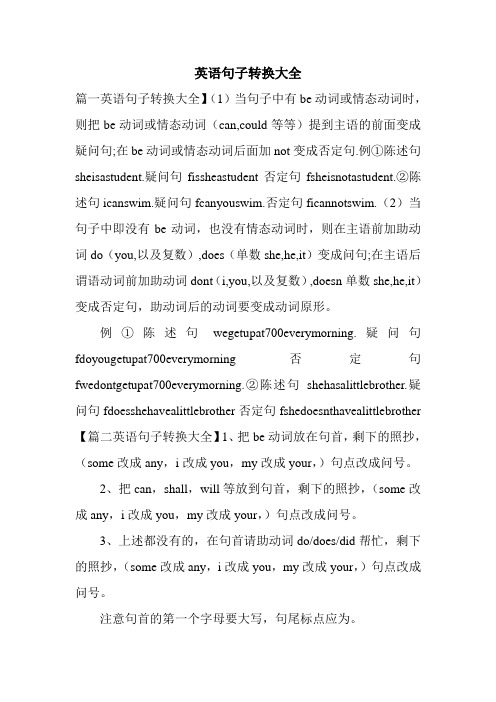
英语句子转换大全篇一英语句子转换大全】(1)当句子中有be动词或情态动词时,则把be动词或情态动词(can,could等等)提到主语的前面变成疑问句;在be动词或情态动词后面加not变成否定句.例①陈述句sheisastudent.疑问句fissheastudent否定句fsheisnotastudent.②陈述句icanswim.疑问句fcanyouswim.否定句ficannotswim.(2)当句子中即没有be动词,也没有情态动词时,则在主语前加助动词do(you,以及复数),does(单数she,he,it)变成问句;在主语后谓语动词前加助动词dont(i,you,以及复数),doesn单数she,he,it)变成否定句,助动词后的动词要变成动词原形。
例①陈述句wegetupat700everymorning.疑问句fdoyougetupat700everymorning否定句fwedontgetupat700everymorning.②陈述句shehasalittlebrother.疑问句fdoesshehavealittlebrother否定句fshedoesnthavealittlebrother 【篇二英语句子转换大全】1、把be动词放在句首,剩下的照抄,(some改成any,i改成you,my改成your,)句点改成问号。
2、把can,shall,will等放到句首,剩下的照抄,(some改成any,i改成you,my改成your,)句点改成问号。
3、上述都没有的,在句首请助动词do/does/did帮忙,剩下的照抄,(some改成any,i改成you,my改成your,)句点改成问号。
注意句首的第一个字母要大写,句尾标点应为。
如iaminclass6.areyouinclass6youarefromamerica.areyoufromamericaiti sanorange.isitanorange答题方法是要想提问,be提前,句末别忘了。
英语句型转换1000例

英语句型转换1000例Sentences 1-10:1. Active to Passive: The teacher praised the student. -> The student was praised by the teacher.2. Passive to Active: The ball was hit by the boy. -> The boy hit the ball.3. Simple Present to Present Continuous: He works in a bank. -> He is working in a bank.4. Present Continuous to Simple Present: We arestudying for the test. -> We study for the tests.5. Simple Past to Past Continuous: I went to the park yesterday. -> I was going to the park yesterday.6. Past Continuous to Simple Past: The children were playing in the garden. -> The children played in the garden.7. Simple Future to Future Continuous: I will visit my grandparents next week. -> I will be visiting my grandparents next week.8. Future Continuous to Simple Future: They will be living in London in 2025. > They will live in London in 2025.9. Present Perfect to Present Perfect Continuous: I have finished my homework. -> I have been finishing my homework.10. Present Perfect Continuous to Present Perfect: She has been studying for hours. -> She has studied for hours.Sentences 11-20:11. Active to Passive (Modal): He can play the piano well. -> The piano can be played well by him.12. Passive to Active (Modal): This book must be readby everyone. -> Everyone must read this book.13. Simple Present to Present Perfect: I know the answer. -> I have known the answer.14. Present Perfect to Simple Past: I have already eaten breakfast. -> I ate breakfast already.15. Past Continuous to Past Perfect: While I was sleeping, the phone rang. -> While I had been sleeping, the phone rang.16. Past Perfect to Past Continuous: After he had finished his work, he went home. -> After he had been finishing his work, he went home.17. Simple Future to Future Perfect: He will have graduated by next year. -> He will graduate by next year.18. Future Perfect to Simple Future: I will have eaten dinner by 7 pm. -> I will eat dinner by 7 pm.19. Present Perfect to Present Perfect Continuous (Negative): I haven't seen him lately. -> I haven't been seeing him lately.20. Present Perfect Continuous to Present Perfect (Negative): She hasn't been working on the project. -> She hasn't worked on the project.Sentences 21-30:21. Active to Passive (With Phrasal Verb): He turnedthe light on. -> The light was turned on by him.22. Passive to Active (With Phrasal Verb): The door was knocked on by the children. -> The children knocked on the door.23. Simple Present to Present Continuous (Continuous Action): He often plays basketball. -> He is playing basketball now.24. Present Continuous to Simple Present (State Action):I am understanding this concept well. > I understand this concept well.25. Simple Past to Past Continuous (Interrupted Action):I was reading a book when the phone rang. -> I interrupted reading a book when the phone rang.26. Past Continuous to Simple Past (Completed Action): We were watching a movie until it ended. -> We watched a movie until it ended.27. Simple Future to Future Continuous (Emphatic Future): I will definitely be studying tomorrow. -> I will be studying tomorrow without fail.28. Future Continuous to Simple Future (Question): Will you be working on the project tomorrow? -> Are you going to work on the project tomorrow?29. Present Perfect to Present Perfect Continuous (Perfect Continuous): I have been studying all day. -> I have studied all day.30. Present Perfect Continuous to Present Perfect (Perfect): She has been working on her thesis for a year. -> She has worked on her thesis for a year.Sentences 31-40:31. Active to Passive (With Indirect Object): He gave the book to me. -> I was given the book by him.32. Passive to Active (With Indirect Object): The money was sent to him by his father. -> His father sent him the money.33. Simple Present to Present Perfect (Experiential Perfect): I have lived in many countries. -> I have had the experience of living in many countries.34. Present Perfect to Simple Past (Narrative Perfect):I told him everything. -> I told him everything in the story.35. Past Continuous to Past Perfect Continuous: As I was walking home, it started to rain. -> As I had been walking home, it started to rain.36. Past Perfect Continuous to Past Continuous: BeforeI left, I had been working on my project for hours. -> Before I left, I was working on my project for hours.37. Simple Future to Future Perfect Continuous: By next year, he will have been living here for 10 years. -> By next year, he will have lived here for 10 years without interruption.38.。
中考英语同义句句型转换大全
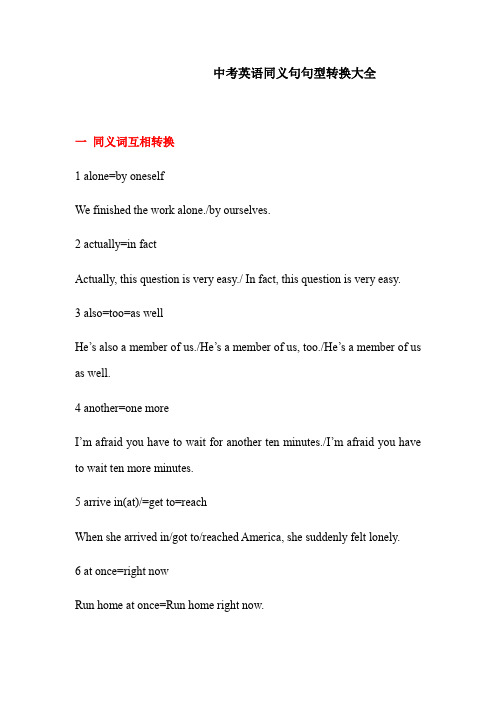
中考英语同义句句型转换大全一同义词互相转换1 alone=by oneselfWe finished the work alone./by ourselves.2 actually=in factActually, this question is very easy./ In fact, this question is very easy.3 also=too=as wellHe’s also a member of us./He’s a member of us, too./He’s a member of us as well.4 another=one moreI’m afraid you have to wait for another ten minutes./I’m afraid you have to wait ten more minutes.5 arrive in(at)/=get to=reachWhen she arrived in/got to/reached America, she suddenly felt lonely.6 at once=right nowRun home at once=Run home right now.7 continue/go onLet’s continue/go on reading the passage.8 cost=spend=take=pay(1)I spent ten yuan of/(in) buying this book../This book cost me tenyuan./I paid ten yuan for this book.(2)It took us three days to fulfill this task./We spent three days on thistask/in fulfilling this task.9 cross=go acrossBefore crossing/going across the road, please look both sides.10 sometimes/=t timesHe is a good man, but he can be really bad-tempered sometimes./at times.11 die/=ose one’s lifeThose people died/lost their lives during the earthquake.12 now/at the momentShe is talking about the problem with her classmates now./at the moment 13 else=otherWhat else/other things can you see in the picture?14 then=t that moment/at that timeShe was shopping then/at that moment/at that time, so she knew nothing about it.15 like/love/enjoy/be fond of/be interested in/care forShe likes/enjoys/loves/is fond of/is interested in/cares for collecting stamps very much.16 will/be going to/be about toThe teachers will/are going to/are about to have a meeting tomorrow afternoon.17 want/would likeDo you want to go abroad to study further?/Would you like to go abroad to study further/18 can/be able to/have the ability to doCan you tell me the way to the library?/Are you able to tell me the way to the library?/Do you have the ability to tell me the way to the library?19 visit/call onLin Tao visited/called on his grandparents last week.20 favorite/like bestWhat’s your favorite sport?/What sport do you like best?21 happen/take placeWhat happened?/What took place?22 decide/make a decision/make up one’s mindShe can’t decide/make a decision/make up her mind where to go.23 found/establish/set upThe students founded/established/set up a group to protect the environment.24 finally/at last/in the endFinally/At last/In the end, she won the race.25 leave/be awayHe left yesterday./He has been away for a day.26 return/give backHe hasn’t returned the book to me./He hasn’t given the book back to me. return/go backHe will go back/return in a month.27 why/what for/how come-She cried so badly. –How come?What did she cry so sadly for?/Why did she cry so badly?28 over/more thanOver/More than a hundred people tried this new kind of food.29 whatever/no matter whatWhatever/No matter what you find in the box, they belong to Amy.30 whenever/no matter whenWhenever/No matter when you come to see me, I will treat you as my relative.31 walk/ go…on footDo you walk to school every day?/Do you go to school on foot every day?32 should/ought to/be supposed toWe should/ought to/are supposed to use both sides of the paper to reduce wastes.33 population/peopleWhat is the population of China?/How many people are there in China?34 quit/stop/drop/give upMy father quitted/stopped/dropped/gave up smoking.35 maybe/perhaps/may beMaybe/Perhaps it is not my pen./ The pen may not be mine.二同义词组互相转换1 a lot of/lots ofA lot of/Lots of artists will show their faces at the party.2 all over the world/around the worldEnglish is spoken widely all over the world./around the world3 not as(so)…as/less thanThis book is not as(so) interesting as that one./That book is more interesting than this one.4 as…as possible/as…as sb canRun home as fast as possible/as fast as you can to tell your mother the good news.5 at risk/in danger/in troubleThe pandas in our country are at risk./in trouble/in danger6 at the age of…/when sb.+be+…years oldHis parents died when he was six years old./His parents died at the age of six.7 because of/due to/as a result of/with one’s help/thanks toBecause of?/Due to/As a result of his help, he passed this exam.With his help/With the help of him, he passed the exam./Thanks to his help, he passed the exam.8 be careful/look out/take careLook out!/Be careful/Take care! The flood is coming.9 be worried about/worry aboutLiu Ming is worried about his following oral test./Liu Ming can’t stop his following oral test.10 both…and…/not only…but also…He is not only a singer but also a doctor./He is both a singer and a doctor.11 be good at/do well inHe is good at drawing./He does well in drawing.12 be proud of/take pride inWe are all proud of our country’s astronaut./He takes pride in ourcountry’s astronaut.13 come up with/think of/have an ideaTome came up an idea./Tom thought of an idea./Tom had an idea.14 ride a bike/go…by bikeHe often rides a bike to work./He often goes to work by bike.15 come from/be fromWhere do you come from?/Where are you from?16 have a good time/enjoy oneself//play happilyWe had a good time/enjoyed ourselves/played happily on Christmas Day.17 have a pain in head/have a headacheHe didn’t go to school today, because he had a pain in head./had a headache18 hear from/receive(get) a letter fromShe is very happy to hear from/receive a letter from a Canadian friend. 19 had better do/It’s best to doYou had better read in the sun./It’s best for you to read in the sun.20 how about/what aboutHow about/What about going skating?21 in order to/in order that/to do/so thatHe worked day and night to be a successful man./He worked day and night in order to be a successful man./He worked day and night in order that he could be a successful man./He worked day and night so that he could be a successful man.22 keep off/keep away fromKeep off /Keep away from the grass!23 in/wearShe is in/wears a white dress today.24 keep sb. from doing/stop sb. (from) doing/prevent sb. (from) doing Trees can stop the soil flowing away./ Trees can prevent the soil flowing away./Trees can keep the soil from flowing away.25 learn …by oneself/ teach oneselfNobody taught him. He learnt it by himself./He taught himself.26 like …better than/prefer…to…/prefer to do…rather than do …John likes swimming better than skating./John prefers swimming to skating./John prefer to swim rather than skate.27 long, long ago/once upon a timeLong, long ago/Once upon a time, there was a beautiful princess living in an old castle.28 look after well/take good care ofThanks for looking after my cat /taking good care of my cat well while I was away.29 no longer/not …any longerShe is no longer a little girl./She is not a little girl any longer.30 shall we/Let’s..Shall we watch the film together?/Let’s watch the film together.31 take part in/join in/participate inHe took part in /joined in/participated in the match.32 too…to/so…that…/enough to…He is too busy to visit us./He is so busy that he can’t visit us./He is not free enough to visit us.三同义句型互相转换1运用两种时态(一般过去时和现在完成时互相转换)(1)He left last year.(2)He has been away for one year.(3)He has been away since a year ago.(4)It is a year since he left.(5)One year has passed since he left.2最高级和比较级的互相转换(1)He is the tallest student in his class.(2)He is taller than any other student in his class.(3)He is taller than the other students in his class.(4)No one else is taller than him in his class.3运用两种语态(主动语态和被动语态互相转换)I clean my room every day./My room is cleaned every day. 4感叹句的两种句型之间互相转换What a careful girl she is!/How careful the girl is!5运用关联词语合并句子(1)Amy can’t dance. Susan can’t, either.Neither Amy nor Susan can dance.(2)I has eaten breakfast and my mother has eaten it, too.Both my mother and I have eaten breakfast.6运用复合句和不定式互相转换(1)I hope that I can visit the moon one day./I hope to visit the moon oneday.(2)He told me how he could use a computer./He told me how to use acomputer.7运用不同的句式结构互相转换(1)She wants to go shopping and her friends want to go shopping,too./She wants to go shopping, and so do her friends.(2)He went to bed after he finished his homework./He went to bed afterfinishing his homework./He didn’t go to bed until he finished his homework.(3)Come on, or we’ll miss the early bus./If we don’t hurry, we’ll miss theearly bus.(4)The man gave us a talk last week, and he will give us another talk thisweek./The man who gave us a talk last week will give us another talk this week.8用it做形式主语互相转换(1)He can finish the work easily./It is easy for him to finish the work.(2)We found it hard to shake./We found it was hard to skate.。
初中英语同义词,词组,句子转换专题
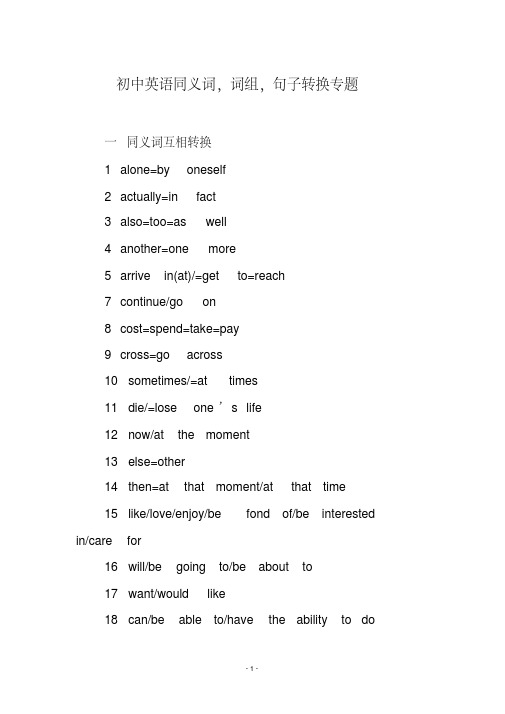
初中英语同义词,词组,句子转换专题一同义词互相转换1alone=by oneself2actually=in fact3also=too=as well4another=one more5arrive in(at)/=get to=reach7continue/go on8cost=spend=take=pay9cross=go across10sometimes/=at times11die/=lose one’s life12now/at the moment13else=other14then=at that moment/at that time15like/love/enjoy/be fond of/be interested in/care for16will/be going to/be about to17want/would like18can/be able to/have the ability to do19visit/call on20favorite/like best21happen/take place22decide/make a decision/make up one’s mind23found/establish/set up24finally/at last/in the end25leave/be away26return/give back27why/what for/how come28over/more than29whatever/no matter what30whenever/no matter when31walk/go…on foot32should/ought to/be supposed to33population/people34quit/stop/drop/give up35maybe/perhaps/may be二同义词组互相转换1a lot of/lots of2all over the world/around the world3not as(so)…as/less than4as…as possible/as…as sb can5at risk/in danger/in trouble6at the age of…/when sb.+be+…years old7because of/due to/as a result of/with one’s help/thanks to8be careful/look out/take care9be worried about/worry about10both…and…/not only…but also…11be good at/do well in12be proud of/take pride in13come up with/think of/have an idea14ride a bike/go…by bike15come from/be from16have a good time/enjoy oneself/ play happily17have a pain in head/have a headache18hear from/receive(get)a letter from19had better do/It’s best to do20how about/what about21in order to/in order that/to do/so that22keep off/keep away from23in/wearShe is in/wears a white dress today.24keep sb.from doing/stop sb.(from)doing/prevent sb.(from)doing25learn…by oneself/teach oneself26like…better than/prefer…to…/prefer to do…rather than do…27long,long ago/once upon a time28look after well/take good care of29no longer/not…any longer30shall we/Let’s..31take part in/join in/participate in32too…to/so…that…/enough to…同义句型互相转换1 运用两种时态(一般过去时和现在完成时互相转换)(1)He left last year.(2)He has been away for one year.(3)He has been away since a year ago.(4)It is a year since he left.(5)One year has passed since he left.2 最高级和比较级的互相转换(1)He is the tallest student in his class.。
初二英语句式转换50题
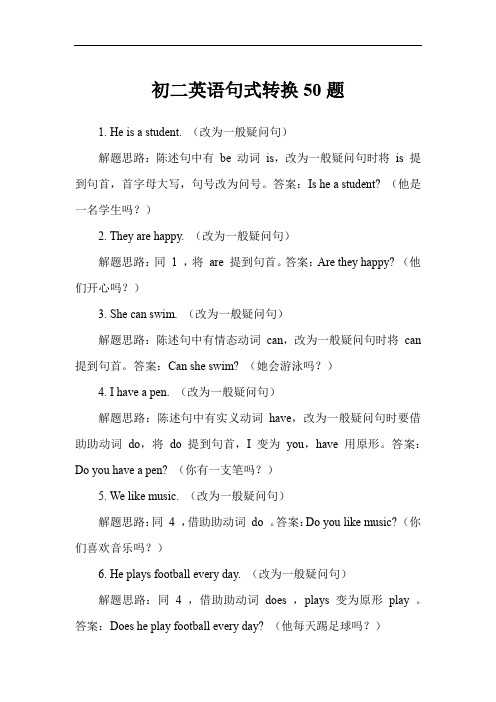
初二英语句式转换50题1. He is a student. (改为一般疑问句)解题思路:陈述句中有be 动词is,改为一般疑问句时将is 提到句首,首字母大写,句号改为问号。
答案:Is he a student? (他是一名学生吗?)2. They are happy. (改为一般疑问句)解题思路:同1 ,将are 提到句首。
答案:Are they happy? (他们开心吗?)3. She can swim. (改为一般疑问句)解题思路:陈述句中有情态动词can,改为一般疑问句时将can 提到句首。
答案:Can she swim? (她会游泳吗?)4. I have a pen. (改为一般疑问句)解题思路:陈述句中有实义动词have,改为一般疑问句时要借助助动词do,将do 提到句首,I 变为you,have 用原形。
答案:Do you have a pen? (你有一支笔吗?)5. We like music. (改为一般疑问句)解题思路:同4 ,借助助动词do 。
答案:Do you like music? (你们喜欢音乐吗?)6. He plays football every day. (改为一般疑问句)解题思路:同 4 ,借助助动词does ,plays 变为原形play 。
答案:Does he play football every day? (他每天踢足球吗?)7. They watch TV in the evening. (改为一般疑问句)解题思路:同6 ,借助助动词do ,watch 用原形。
答案:Do they watch TV in the evening? (他们晚上看电视吗?)8. She has breakfast at seven. (改为一般疑问句)解题思路:同 6 ,借助助动词does ,has 变为have 。
答案:Does she have breakfast at seven? (她七点吃早餐吗?)9. The boy likes apples. (改为一般疑问句)解题思路:同6 ,借助助动词does ,likes 变为like 。
英语句型转换与句子结构练习40道
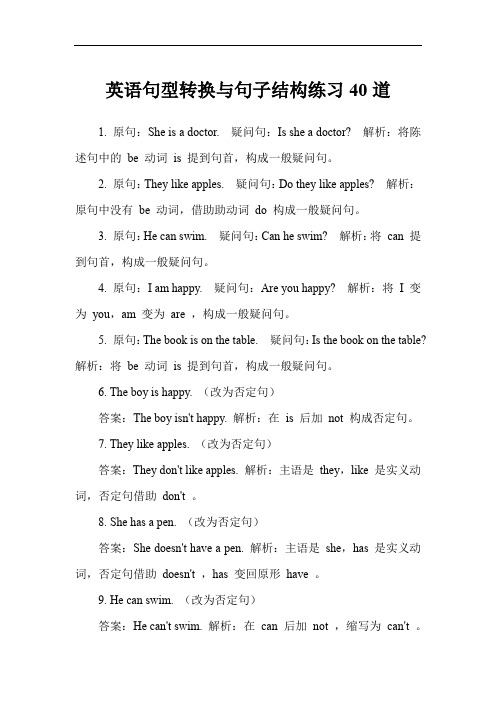
英语句型转换与句子结构练习40道1. 原句:She is a doctor. 疑问句:Is she a doctor? 解析:将陈述句中的be 动词is 提到句首,构成一般疑问句。
2. 原句:They like apples. 疑问句:Do they like apples? 解析:原句中没有be 动词,借助助动词do 构成一般疑问句。
3. 原句:He can swim. 疑问句:Can he swim? 解析:将can 提到句首,构成一般疑问句。
4. 原句:I am happy. 疑问句:Are you happy? 解析:将I 变为you,am 变为are ,构成一般疑问句。
5. 原句:The book is on the table. 疑问句:Is the book on the table? 解析:将be 动词is 提到句首,构成一般疑问句。
6. The boy is happy. (改为否定句)答案:The boy isn't happy. 解析:在is 后加not 构成否定句。
7. They like apples. (改为否定句)答案:They don't like apples. 解析:主语是they,like 是实义动词,否定句借助don't 。
8. She has a pen. (改为否定句)答案:She doesn't have a pen. 解析:主语是she,has 是实义动词,否定句借助doesn't ,has 变回原形have 。
9. He can swim. (改为否定句)答案:He can't swim. 解析:在can 后加not ,缩写为can't 。
10. I am a teacher. (改为否定句)答案:I'm not a teacher. 解析:在am 后加not ,缩写为'm not 。
句型转换练习题及答案

句型转换练习题及答案句型转换练习题及答案语言是人类交流的基本工具,而句型则是构建语言的基本单位。
在学习语言的过程中,掌握句型转换是非常重要的一部分。
通过句型转换,我们可以更灵活地运用语言,表达自己的思想和观点。
下面是一些句型转换的练习题及答案,希望能够帮助大家提高语言表达能力。
练习题一:改写句子的时态1. He will go to the park tomorrow.改为一般现在时:He goes to the park tomorrow.改为过去时:He went to the park tomorrow.2. They have been studying English for two years.改为一般将来时:They will have been studying English for two years.改为过去完成时:They had studied English for two years.3. She is going to visit her grandparents next week.改为一般过去时:She visited her grandparents next week.改为现在进行时:She is visiting her grandparents next week.练习题二:改写句子的语态1. They built a new bridge last year.改为被动语态:A new bridge was built by them last year.2. We are cleaning the house now.改为被动语态:The house is being cleaned by us now.3. Someone has stolen my wallet.改为被动语态:My wallet has been stolen by someone. 练习题三:改写句子的句式1. I like playing football.改为否定句:I don't like playing football.改为一般疑问句:Do you like playing football?2. She can speak three languages.改为否定句:She can't speak three languages.改为特殊疑问句:What languages can she speak?3. He is a doctor.改为感叹句:What a doctor he is!练习题四:改写句子的形式1. He said, "I am busy now."改为间接引语:He said that he was busy then.2. "Please close the door," she said.改为间接引语:She asked me to close the door.3. "Don't eat too much," my mother said to me.改为间接引语:My mother told me not to eat too much. 答案:练习题一:1. He goes to the park tomorrow.2. He went to the park tomorrow.3. She visited her grandparents next week.4. She is visiting her grandparents next week.练习题二:1. A new bridge was built by them last year.2. The house is being cleaned by us now.3. My wallet has been stolen by someone.练习题三:1. I don't like playing football.2. Do you like playing football?3. She can't speak three languages.4. What languages can she speak?5. What a doctor he is!练习题四:1. He said that he was busy then.2. She asked me to close the door.3. My mother told me not to eat too much.通过这些句型转换的练习题,我们可以更好地理解和运用不同的句型,提高语言表达的能力。
初一英语语法--句型转换(详细内容)

初一英语语法--句型转换(详细内容)初一英语语法—句型转换内容:陈述句:肯定句否定句疑问句:一般疑问句特殊疑问句一.肯定句变否定句1.句子中有be,在be后加not。
(be动词有am , is , are, was, were)1)I am a student. I am not a student.2)They are blue . They aren’t blue.3) He is Kangkang. He is n’t Kangkang .4) I was ten last year. I wasn't ten yesterday.5) He was good at English. He wasn't good at English.6) They were at home last Sunday. They weren't at home last Sunday.练习:把下列句子变为否定句1.His father is an English teacher._____________________________2.He is crying under the tree. ___________________________ __3.He was thirteen years old two years ago._______________________4.They are very lucky.______________________________________5.t the family was poor.6.My voice was too weak.2.谓语是动词原形,在动词前加don’t。
7.I have a book . I don’t have a book.8.They like Chinese . They don’t like Chinese.9.3) We come from China. We don’t come from China.3.谓语动词是第三人称单数,在动词前加doesn’t,动词用原形。
初三英语句型转换练习40道

初三英语句型转换练习40道1. She plays basketball every day. (改为一般过去时)答案:She played basketball yesterday.解析:一般现在时变为一般过去时,谓语动词要变成过去式。
play 的过去式是played。
2. They are at home now. (改为一般过去时)答案:They were at home yesterday.解析:are 的过去式是were。
3. I do my homework in the evening. (改为一般过去时)答案:I did my homework last night.解析:do 的过去式是did。
4. He doesn't like music. (改为一般过去时)答案:He didn't like music.解析:doesn't 的过去式是didn't,后面接动词原形like。
5. Does she go to school by bike? (改为一般过去时)答案:Did she go to school by bike?解析:does 的过去式是did,后面接动词原形go。
6. They are playing football now. (改为过去进行时)答案:They were playing football at that time.解析:现在进行时改为过去进行时,be 动词由are 变为were,now 变为at that time。
7. She was doing her homework at 8 o'clock last night. (改为现在进行时)答案:She is doing her homework now.解析:过去进行时改为现在进行时,be 动词由was 变为is,at 8 o'clock last night 变为now。
英语作文高级句子转换例句
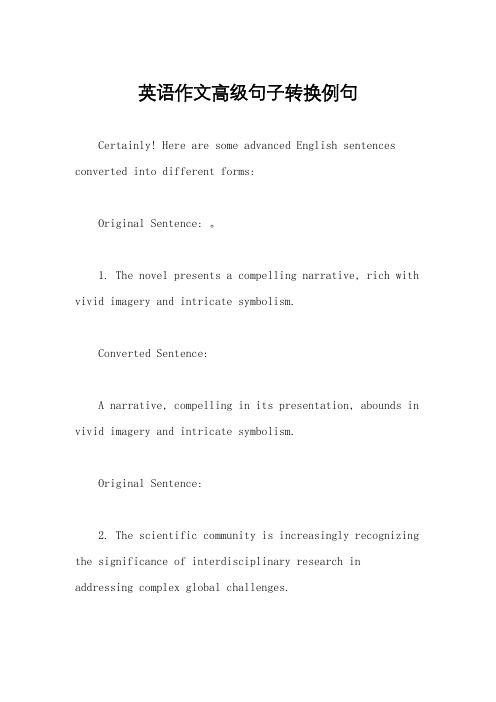
英语作文高级句子转换例句Certainly! Here are some advanced English sentences converted into different forms:Original Sentence: 。
1. The novel presents a compelling narrative, rich with vivid imagery and intricate symbolism.Converted Sentence:A narrative, compelling in its presentation, abounds in vivid imagery and intricate symbolism.Original Sentence:2. The scientific community is increasingly recognizing the significance of interdisciplinary research in addressing complex global challenges.Converted Sentence:Interdisciplinary research is gaining recognitionwithin the scientific community for its pivotal role in tackling complex global challenges.Original Sentence:3. The government's austerity measures have sparked widespread debate and drawn criticism from various quarters.Converted Sentence:Widespread debate and criticism from diverse quarters have been sparked by the government's austerity measures.Original Sentence:4. The company's innovative approach to marketing has propelled it to the forefront of the industry.Converted Sentence:It is the company's innovative marketing approach that has propelled it to the forefront of the industry.Original Sentence:5. Despite facing numerous obstacles, she remained resolute in her pursuit of excellence.Converted Sentence:Despite the multitude of obstacles encountered, her pursuit of excellence remained resolute.Original Sentence:6. The report underscores the urgent need for comprehensive healthcare reform to address systemic inefficiencies.Converted Sentence:Emphasizing the urgent necessity for comprehensive healthcare reform, the report highlights systemic inefficiencies.Original Sentence:7. The artist's latest exhibition showcases a masterful blend of tradition and modernity, captivating audiences worldwide.Converted Sentence:Captivating audiences worldwide, the artist's latest exhibition exemplifies a masterful fusion of tradition and modernity.Original Sentence:8. Through meticulous planning and diligent execution, the team was able to surpass all expectations and achieve unprecedented success.Converted Sentence:Surpassing all expectations and achieving unprecedented success was possible for the team through meticulous planning and diligent execution.These transformations showcase various ways to rephrase advanced sentences while maintaining their complexity and sophistication.。
肯定句变疑问句的转换规则英语

肯定句变疑问句的转换规则英语
肯定句变疑问句的转换规则如下:
1. 将句子的语序从主谓倒置。
例如:
- 肯定句:He is a doctor.
- 疑问句:Is he a doctor?
2. 在句子开头添加助动词或系动词。
例如:
- 肯定句:She likes ice cream.
- 疑问句:Does she like ice cream?
3. 如果句子已经有助动词或系动词,则将其提前。
例如:
- 肯定句:They have finished their homework.
- 疑问句:Have they finished their homework?
4. 如果句子中已经有助动词或系动词以及其他情态动词,这些动词需要跟随主语后。
例如:
- 肯定句:She can speak Chinese.
- 疑问句:Can she speak Chinese?
需要注意的是,转换为疑问句后,句子的语气将会发生改变,变为询问的语气。
同时,如果句子中有疑问词(如who, what, when, where, why等),要将疑问词放在句子开头,并进行语序倒置。
英语在线句型转换

英语在线句型转换
本文将为大家介绍英语中常见的句型转换,帮助大家更好地理解和运用英语语法。
1. 主动语态转被动语态
主动语态的结构为“主语+动词+宾语”,而被动语态则是“宾语
+be动词+过去分词+by+主语”。
例如:
主动语态:The teacher teaches the students.
被动语态:The students are taught by the teacher.
2. 直接引语转间接引语
直接引语是将别人的话原封不动地引用出来,而间接引语则是将别人的话转述出来。
例如:
直接引语:He said, “I am happy.”
间接引语:He said that he was happy.
3. 简单句转复合句
简单句只包含一个主语和一个谓语,而复合句则包含主句和从句。
例如:
简单句:He goes to school.
复合句:When he goes to school, he usually takes the bus.
4. 否定句转肯定句
将否定词(如not)移动到正确的位置即可将否定句转为肯定句。
例如:
否定句:I do not like coffee.
肯定句:I like coffee.
5. 疑问句转陈述句
将疑问句中的疑问词(如what, who, where等)去掉,并将动词改为陈述句的形式即可将疑问句转为陈述句。
例如:
疑问句:Where is the library?
陈述句:The library is here.
以上是英语中常见的句型转换,希望大家能够掌握并应用于实践中。
- 1、下载文档前请自行甄别文档内容的完整性,平台不提供额外的编辑、内容补充、找答案等附加服务。
- 2、"仅部分预览"的文档,不可在线预览部分如存在完整性等问题,可反馈申请退款(可完整预览的文档不适用该条件!)。
- 3、如文档侵犯您的权益,请联系客服反馈,我们会尽快为您处理(人工客服工作时间:9:00-18:30)。
英语句子转换大全为什么又要分词类,又要分句子成分呢?词类和句子成分是不同的概念.同一个词类可以在句中充当不同的成分,同一个句子成分也可以由不同的词类来担任. 那么什么叫句子成分呢?句子的组成成分叫句子成分.在句子中,词与词之间有一定的组合关系,按照不同的关系,可以把句子分为不同的组成成分.句子成分由词或词组充当. 现代汉语里一般的句子成分有六种,即主语、谓语、宾语、定语、状语和补语.英语的基本成分有六种:主语(subject)、谓语(predicate)、表语(predicative)、宾语(object)、定语(attribute)和状语(adverbial).英语句子成分中,有些具有形态标志.如第一人称代词作主语就用主格“I”,作宾语用宾格“me”,作定语用所有格“my”.这些形态变化对分析辨认成分很有帮助. 汉语与英语就句子成分表面上看来差不多,实际上有不少差别.例如:(1) Xiao Li went to bed as soon as he came home. 小李回家后,立刻就睡觉了. (2) I'll go when I have had my dinner. 我吃了饭就去. 在英语中,同一个主语在第二次出现时不能省略,必须把每个谓语所陈述的对象都表示出来.而在汉语中,同一个主语在句中第二次出现时,就可以省略.如例(1)中,汉语说“小李回家后立刻就睡觉了”,省去了第二个分句的主语,倒可以避免造成误解.若将第二次出现的主语补出来,说成“小李回家后,他立刻就睡觉了”.听的人反而可能把那个“他”误会成另一个人. 把句子的各个成分搞清楚,也就是把句子各部分的关系搞清楚.做到这一点,才可以准确地理解句子的意思或造出结构正确、意思明白的句子.有一点要注意,在分析句子结构时,应该抓住主要成分.我们分析句子结构,划分句子成分无非是为了理解,或者是为了造句.这个目的达到了就行了,不必过于细致,更不要钻牛角尖,否则就会事倍功半. 各种语言有各自的规则、各自的习惯,而且语言是很灵活的东西,发展过程也很复杂,很难把语法的现象都做出明确、统一的解释来.在使用一种语言时,语法应让位于习惯.符合习惯的,有时尽管不符合语法,也是正确的. 英语句子有长在短,有简有繁,从现象看,似乎千变万化,难以捉摸,但从实质看,可以发现其内在联系,找出其共同规律.英语句子的基本结构可以归纳成五种基本句型及其扩大、组合、省略或倒装.掌握这五种基本句型,是掌握各种英语句子结构的基础. 英语五种基本句型列式如下:基本句型一: S V (主+谓)基本句型二: S V P (主+谓+表)基本句型三: S V O (主+谓+宾)基本句型四: S V o O (主+谓+间宾+直宾)基本句型五: S V O C (主+谓+宾+宾补)基本句型一此句型的句子有一个共同特点,即句子的谓语动词都能表达完整的意思.这类动词叫做不及物动词,后面可以跟副词、介词短语、状语从句等.┏━━━━━━━━━━━━━━━┯━━━━━━━━━━━━━━━┓┃ S │ V (不及物动词)┃┠———————————————┼———————————————┨┃1. The sun │was shining. ┃┃2. The moon │rose. ┃┃3. The universe │remains. ┃┃4. We all │breathe, eat, anddrink. ┃┃5. Who │cares?┃┃6. What he said │does not matter. ┃┃7. They │talked for half an hour. ┃┃8. The pen │writes smoothly ┃ 1. 太阳在照耀着. 2. 月亮升起了. 3. 宇宙长存. 4. 我们大家都呼吸、吃和喝. 5. 管它呢? 6. 他所讲的没有什么关系. 7. 他们谈了半个小时. 8. 这支笔书写流利. 基本句型二此句型的句子有一个共同的特点:句子谓语动词都不能表达一个完整的意思,必须加上一个表明主语身份或状态的表语构成复合谓语,才能表达完整的意思.这类动词叫做连系动词.系动词分两类:be, look, keep, seem等属一类,表示情况;get, grow, bee, turn等属另一类,表示变化.be 本身没有什么意义,只起连系主语和表语的作用.其它系动词仍保持其部分词义.┏━━━━━━━┯━━━━━━━┯━━━━━━━━━━━━━━━┓┃ S │V(是系动词)│ P ┃┠———————┼———————┼———————————————┨┃1. This │is │an English-Chinese dictionary.┃┃2. The dinner │smells │good. ┃┃3. He │fell │in love. ┃┃4. Everything │looks │different. ┃┃5. He │is growing │tall and strong. ┃┃6. The trouble│is │that they are short of money. ┃┃7. Our well │has gone │dry. ┃┃8. His face │turned │red. ┃┗━━━━━━━┷━━━━━━━┷━━━━━━━━━━━━━━━┛ 1. 这是本英汉辞典. 2. 午餐的气味很好. 3. 他堕入了情网. 4. 一切看来都不同了. 5. 他长得又高又壮. 6. 麻烦的是他们缺少钱. 7. 我们的井干枯了. 8. 他的脸红了. 基本句型三此句型句子的共同特点是:谓语动词都具有实义,都是主语产生的动作,但不能表达完整的意思,必须跟有一个宾语,即动作的承受者,才能使意思完整.这类动词叫做及物动词.┏━━━━━━━┯━━━━━━━┯━━━━━━━━━━━━━━━┓┃ S │V (及物动词)│ O ┃┠———————┼———————┼———————————————┨┃1. Who │。
1 I have my sunglasses?(一般疑问句) Do you have your sunglasses?2 Does she have a camera?(否定回答) No, she doesn't.3 Mr brown is a doctor。
His wife is also a doctor。
(同义句) Both Mr. Brown and his wife are doctors. 4 Tom enjoyed eating spicy food in china。
(一般疑问句) Did Tom enjoy eating spicy food in China?5 Bob did some cleaning in his office yesterday。
(否定句)Bob didn't do any cleaning in his office yesterday6 Does he like the poem?(复数) Do they like the poem?7 He doesn't know much chinese。
(同义句) He knows little Chinese. 8 Are they taking photos?(肯定句) Yes, they are. 9 They have some cameras。
(否定句) They don't have any cameras. 10 I'm writing a poem for National Day。
(划线提问) 11 The children go to school by bus。
(划线提问) 12 Jim and I ar4 classmates。
(同义句) Jim and I are in the same class. 13 His uncle bought him a new toy car。
(同义句) His uncle bought a new toy car for him. 14 I have three sheep on the farm。
(划线提问) 15 There is a T-shirt in the box。
(复数句) There are some T-shirt in the box. 16 I have a headache。
(问句) What's wrong with you? 17 Mr Smith is Australian。
(同义句) Mr Smith is from Australia. 18 My mother likes having eggs for breakfast。
(一般疑问句) Does your mother like having eggs for breakfast? 19 What's your sister like?(答句) She is talland slim. 20 Jack likes drinking tea。
(coffee选择问句) Does Jack like drinking tea or coffee? 21 These are Tom's books。
((划线提问) 22 These are their shirts。
(同义句)These shirts are theirs. 23 Is there a book in the desk?(复数句) Are there any books in the desk? 24 What's your father's job?(同义句) What does your father do?/What is your father? 25 Does your mother like sports?(否定回答)No, she doesn't. 26 There are some CDS on the table。
(划线提问) 27 We played tennis last Saturday。
(划线提问) 28 It's time for school。
(同义句) It's time to go to school.。
我有几句较好的,非常适合写作文,基本上一用上它们,作文分就会很高!一、~~~ the + ~ est + 名词 + (that) + 主词 + have ever + seen ( known/heard/had/read, etc) ~~~ the most + 形容词 + 名词 + (that) + 主词 + have ever + seen( known/heard/had/read, etc) 例句:Helen is the mostbeautiful girl that I have ever seen. 海伦是我所看过最美丽的女孩。
